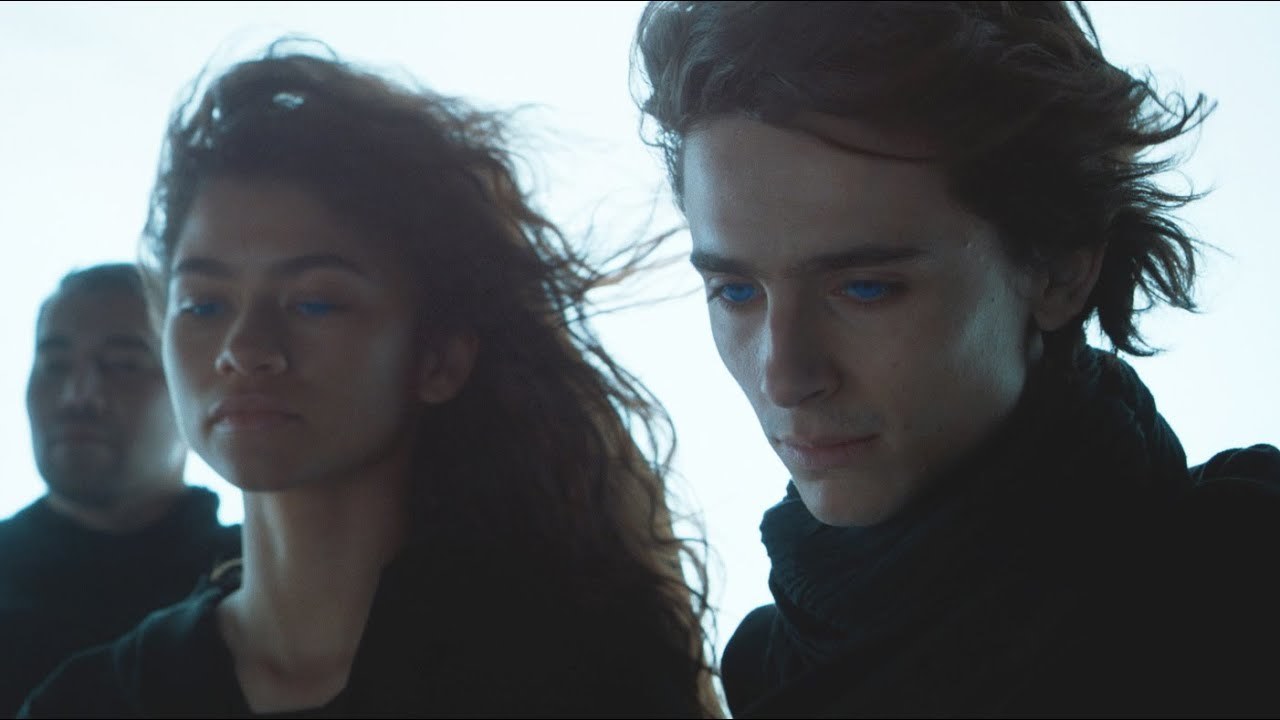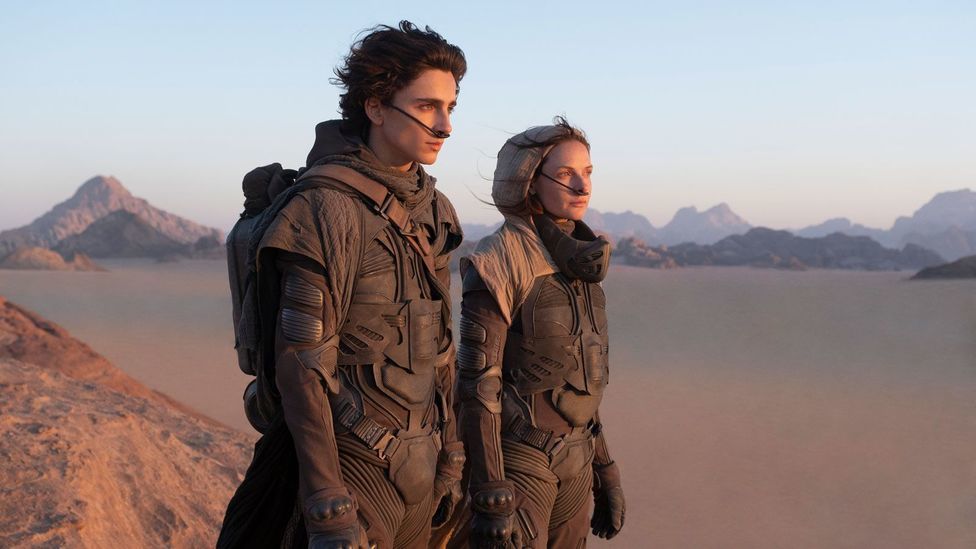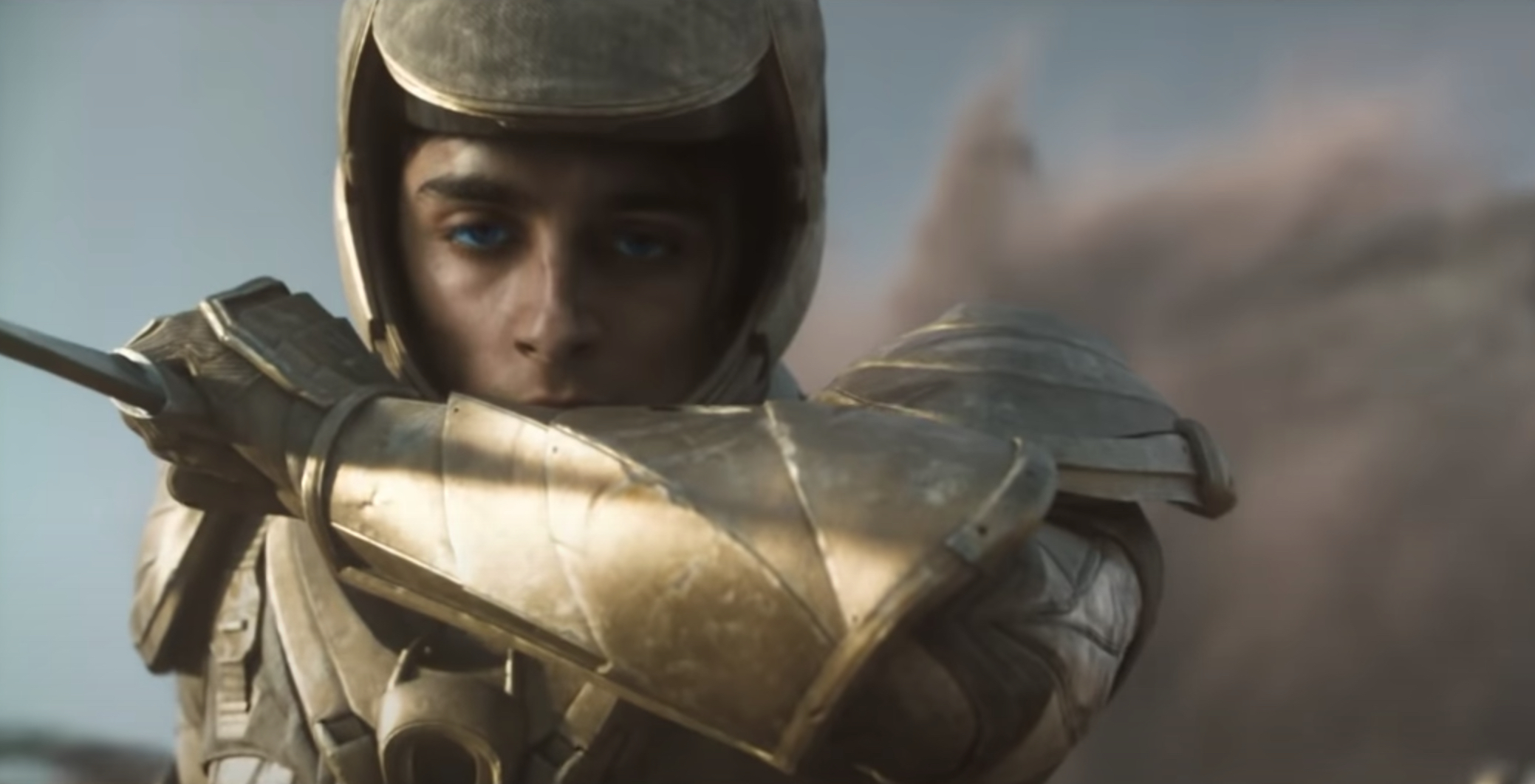I remember checking out the first teaser trailer for Denis Villeneuve’s adaptation of Frank Herbert’s Dune. That was well over a year ago now. Can you believe that? Despite last year being incredibly difficult for all of us, there were a few things that got us all excited. We could all club together and it became a unified experience. We dumped our worries outside and just enjoyed something together. I think Dune was one of those experiences and it was definitely a big one. We got an epic trailer and then shortly after we received Hans Zimmer’s insane cover of Pink Floyd’s Eclipse. There was this electric buzz surrounding Dune and I was gradually pulled in.
However, there was something scary about it. I was interested in a project that I knew very little about. Like a lot of people, I recognised the hulking sandworms. The giant sandworms have become somewhat synonymous with Dune, so that bit was easy. But when I looked at the bigger picture, I realised that I had no knowledge about the world of Dune, the various Houses, the characters and the deep mythology that Herbert sewed into his work. There was something about Dune that enticed me.and I thought the gap between the jumping launch dates would provide me with enough time to explore Arrakis and Caladan. But then I made the conscious decision to avoid anything and everything relating to Dune… I wanted to go in fully blind.
I had the absolute priviledge, thanks to Warner Bros., to be among the first in the UK to watch Dune and what a screening it was. Excitement and anticipation coarsed through our veins and as the lights dimmed to darkness… we were all transported off world and into the void of space.
What is Dune? here’s a brief synopsis:
Dune takes us to a future like no other and it can only really be described as a mythic and emotionally charged hero’s journey. Dune tells the story of Paul Atreides, a brilliant and gifted young man born into a great destiny beyond his understanding, who must travel to the most dangerous planet in the universe to ensure the future of his family and his people. As malevolent forces explode into conflict over the planet’s exclusive supply of the most precious resource in existence—a commodity capable of unlocking humanity’s greatest potential—only those who can conquer their fear will survive.

Due to my lack of exposure to Dune and Herbert’s world, I feel as though my experience was somewhat different in comparison. As expected, there was quite a lot to digest in terms of the mythology but it was cleverly woven into the story. The film supplies you with everything you need in order to understand the lore without it diluting the story and without it coming across as too heavy.
However, if I were to “criticise” a particular element of Dune it would be regarding its length. It’s a long film. However, it went by very quickly and there was never a dull moment. There was always something happening whether it was exploring the golden deserts of Arrakis or diving deep into Paul’s dreams and fears. The problem, quite an unavoidable problem, is that this film is very much a set up for a much larger sequel. The seeds are planted brilliantly in that regard. However, when you look at the beats for this set up, there are brief moments where you really feel that length creep in. This isn’t necessarily a problem with Dune itself but rather the format. We’ve been presented with an incomplete story. A story that has a lot of ground to cover so Part 1 had to do two things. One, it had to effectively and precisely establish this futuristic reality which literally transcends worlds and encompasses various cultures. Two, it had to establish the characters of this story while building up to the moment where everything changes.
So I think this “criticism” originates from my desire for more. Dune is an incomplete narrative that promises a lot and is full of many unanswered questions. As someone who is new to the harsh world of Arrakis, I simply want to know what follows.

While the visuals do play a major role in this film, as you’ll soon see, this epic conquest would be nothing without the powerful and intense performances from the stellar cast. Timothée Chalamet shines as Paul Atreudes alongside Rebecca Ferguson who plays Jessica. They make an incredible team and they’re both simply enchanting to watch. Jessica is fierce, protective and strong-willed while Paul starts off as quite timid and unsure. Complete binary opposites. However, as the film unfolds, it soon becomes obvious that there is so much more to Paul and Chalamet’s transformation is both physical and mental. You can see and hear the difference between Paul when we first meet him and the Paul we see at the end.
Honestly, the entire cast is fantastic. The chemistry between Paul and Jason Momoa’s Duncan is endearing and playful which only adds to the inevitable heartbreak, while the Harkonnen’s maintain this dark and incredibly sinister demeanor. Despite having a very reserved role, Stellan Skarsgard’s The Baron is utterly chilling with his overwhelming voice and towering physique. He has this threatening presence that completely separates him from other villains and I can’t wait to hopefully see what The Baron has planned next.
One of the biggest hooks for me as a new Dune fan, was this prospect of an interstellar adventure. Science fiction is an incredible genre that has shaped our understanding of the future and has really enhanced our own imagination. Let me tell you, Dune is on an entirely different level. For a film that is set primarily in a desert, there is so much life. variety and striking oppositions. House Atreides, House Harkonnen, the Fremen, and each location offers something different in terms of colour and aesthetic. There’s this wonderful mixture of both futuristic and rather old-fashioned elements that just merge and mix beautifully. We’re not dealing with colossal cities that are thriving on the latest technology. No. There’s an ancient coat that gives these planets and the various Houses this sense of power and respect. It’s only through the technical side of Dune do we see how far humanity has come.

I was absolutely blown away by the overall scale of this movie. The depth, detail, design and craft is utterly flawless. The costume designs, the various ecosystems, and the weapons and ships just feel and look so real. But arguably the most impressive visual element of Dune is how Arrakis became a character in itself. The vast plains feel very much alive and the presence of the insanely terrifying sandworms only enhances the scale. Sure, seeing the sandworms was incredible. But it’s the way they interacted with the elements that impressed me the most. In a nutshell, Dune is one of the most visually captivating movies that I’ve had the pleasure of watching. The key to its visual success boils down to the fact that it tricked everyone into thinking its all real. That’s how good it looks. Despite being set 8,000 years in the future, everything looked and felt authentic.
As a diehard Hans Zimmer fan, it’s near on impossible to discuss Dune without mentioning the breathtaking soundtrack. I’m still under the opinion that movie soundtracks are becoming increasingly more appreciated. Not that they were ever discarded or ignored, it just seems that people are more aware of the importance of music. Zimmer’s score is a fascinating one. Not only is it wildly different to his other projects, but it feels as though it shouldn’t suit Dune. That’s what makes Dune such a unique undertaking. It has all of the foundations of a sci-fi movie, yet it could not be more different and the music plays a huge part in that. There’s this sacred and somewhat spiritual aura to Zimmer’s soundtrack. When you look at Paul and his evolution from Paul Atreides to this holy figure, Muad’Dib, the rousing music makes a lot more sense. It’s grand and surprisingly operatic which ultimately elevates the film and further complements its visuals. Just like how the sands of Arrakis morphed into its own character, Zimmer’s soundtrack exists to immerse us deeper into this foreboding universe. Not only does it exceed phenomenally, it transforms the entire experience that is Dune.
Dune is a mesmerising and stunning adaptation. It’s scale and scope makes it the perfect film for the cinema. You simply have to watch it on the big screen in order to fully appreciate the sensory overload that Villeneuve has created. Sure, it is quite a lengthy film that occassionally struggles in regards to the overall pace, but the ideas, mythology and astonishing visuals are sure to please old fans and bring in new ones. The thing that holds Dune back is that it’s just a prologue at the moment, so there is no fixed conclusion. The real issue with this is that the success of Dune will fully dictate whether we get a Part II. Now, if Dune underperforms and a sequel is taken from us, it will be an absolute disaster. Based on what Dune is teasing, especially with Paul’s looming ascension, there is so much that we haven’t seen. We need to see what’s next through Villeneuve’s eyes. It just has to be done.
Have you seen Dune? Let us know your thoughts in the comments.
Dune stars Timothee Chalamet in the lead role of Paul Atreides, Javier Bardem as Stilgar, Josh Brolin as Gurney Halleck, Zendaya as Chani, Oscar Isaac as Duke Leto Atreides, Rebecca Ferguson as Lady Jessica, Stellan Skarsgard as Baron Harkonnen, Dave Bautista as “The Beast” Rabban, Jason Momoa as Duncan Idaho and Charlotte Rampling as the Reverend Mother.
The film hits cinemas in the UK on October 21, 2021. Be sure to check out Dune on the biggest screen possible. You definitely won’t regret it. Interested in more Dune related content? Check out what we have in store here.
Follow us on Facebook, on Twitter @GetYourComicOn, or on Instagram at GetYourComicOn. If you have a story suggestion email feedback@getyourcomicon.co.uk.